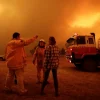Severe flooding has ravaged central Europe following heavy weekend rainfall, transforming peaceful streams into destructive rivers. The deluge has claimed at least 15 lives and damaged infrastructure from Austria to Romania.
These floods came on the heels of global flooding events last week, which submerged villages in Myanmar and led to a prison collapse in Nigeria, impacting over a million people.
Climate scientists are concerned but not surprised by the devastation. Joyce Kimutai of Imperial College London noted that such extreme weather aligns with predictions linked to climate change.
She emphasized that the floods across Africa and Europe underscore how inadequately the world is prepared for these events.

Sonia Seneviratne, a climate expert from ETH Zürich, explained that much of the moisture fueling the central European downpours likely originated from the Black Sea and Mediterranean, both of which have seen temperature rises due to human-induced climate change. This has led to increased evaporation and heavier rainfall.
Seneviratne added that for every degree of global warming, the intensity of heavy precipitation rises by 7%. With global temperatures currently 1.2°C above pre-industrial levels, heavy rainfall is now approximately 8% more intense.
In Poland, the floods collapsed bridges and swept away homes, while helicopters were used in the Czech Republic to rescue stranded individuals.
Austria saw a firefighter lose his life in rescue efforts. Vienna, host to Europe’s largest weather conference, experienced flooding that closed highways and metro services.
Scientists continue to urge governments to invest in infrastructure to better withstand extreme weather, while also transitioning away from fossil fuels to mitigate future climate impacts.

